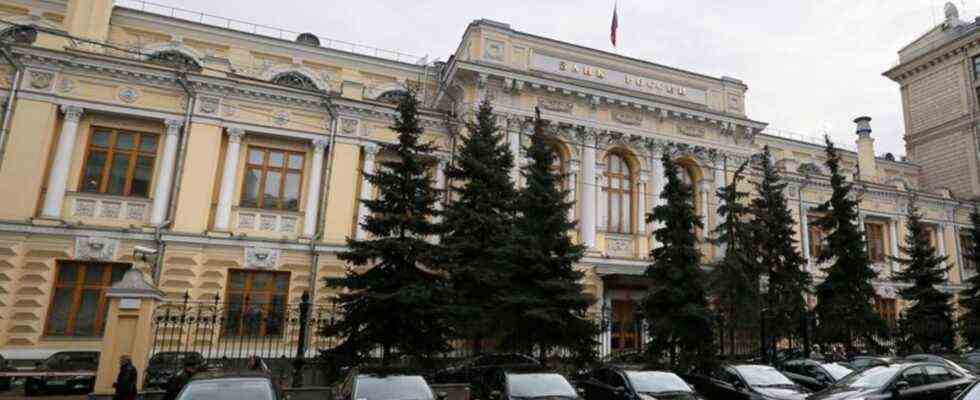Swift and Central Bank
Financial markets weighed down by sanctions against Russia
An exterior view of the Central Bank of Russia building in Moscow. Photo: Yuri Kochetkov/EPA/dpa/archive image
© dpa-infocom GmbH
The market reactions to the war in Europe started by Russia have so far been manageable. Analysts emphasize that there is no sign of panic, even if the fluctuations are likely to remain large.
The western sanctions against Russia, which were tightened over the weekend, hit the financial markets hard at the start of the week. Rising prices for commodities such as oil could fuel inflation further.
In addition, trade with Russia threatens to come to a standstill in many areas following the exclusion of large Russian financial institutions from the Swift banking communications network. Investors rely on investments that are considered safe havens, such as the US dollar, bonds or gold. The Russian ruble plummets.
“President Putin will now have to accept that Western powers are willing to take some economic pain to punish Russia,” Oanda analyst Jeffrey Halley wrote in a market commentary.
Russian financial system isolated
The West is tightening the sanctions screw against Russia and also wants to supply additional weapons to the Ukrainian armed forces. On Monday night, the European Union implemented its severe sanctions against the Russian central bank. According to EU Commission President Ursula von der Leyen, they include a ban on transactions with the financial institution. In addition, all assets of the bank in the EU will be frozen.
The Russian ruble then plummeted. Most recently, 112 rubles had to be paid for one US dollar, a third more than on Friday. It didn’t help much that the Russian central bank raised the key interest rate by 10.5 percentage points to 20.0 percent.
Russia’s central bank also wants to support the domestic financial system with further measures. Securities dealers were now prohibited from selling Russian securities owned by foreigners, as the bank announced on Monday morning. Domestic financial institutions are also to be supported with capital injections and foreign currency transactions.
Not all areas affected by Swift exclusion
In addition, Germany, the United States and other Western allies decided to exclude Russian financial institutions from the Swift banking communications network. According to experts, however, this will also weigh on the German economy, and trade with Russia could largely come to a standstill. However, it seems to have been important to the federal government that gas and other raw material deliveries can continue to be paid for. That could be done through the banks remaining in the Swift system, it said.
The European gas price still jumped by a third on Monday morning. Oil prices rose more than 5 percent. For a barrel (159 liters) of the North Sea Brent, more than 100 dollars had to be paid again.
On the stock market, the Dax fell by 2.1 percent at the start of trading. The leading German index thus remained well above the 14,000 point mark. Significant price gains in armaments became a counterpoint to the market-wide price losses after Chancellor Olaf Scholz (SPD) announced in the Bundestag on Sunday that the Bundeswehr would receive 100 billion euros. The Rheinmetall share jumped by around 40 percent.
The exchange rate of the US dollar rose against the euro. Most recently, 1.1192 dollars had to be paid for one euro. The price of gold rose by half a percent to around $1,900. The price remained below its previous week high. For February, the precious metal is still clearly in positive territory. German Bunds started trading on Monday with price gains.

